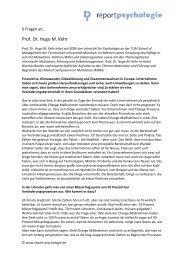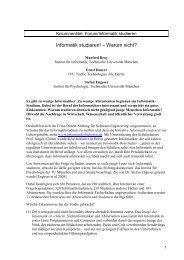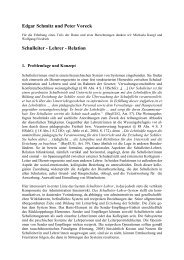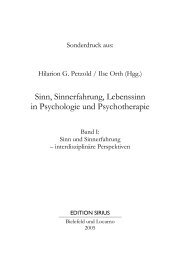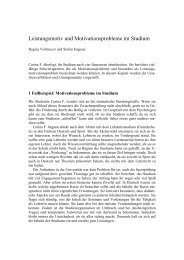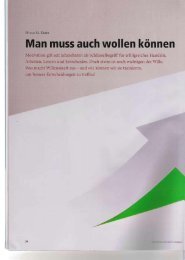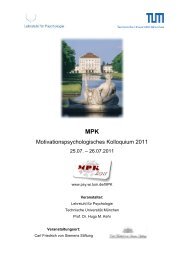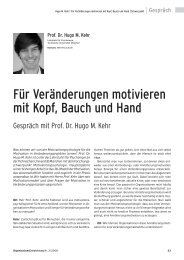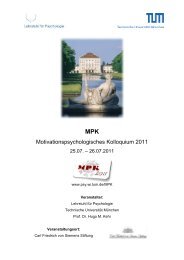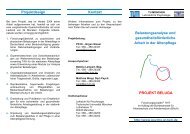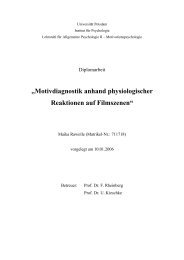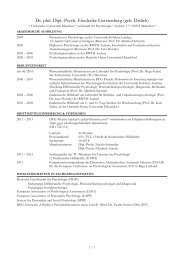Running head: Incentives and flow-experience in learning settings ...
Running head: Incentives and flow-experience in learning settings ...
Running head: Incentives and flow-experience in learning settings ...
- No tags were found...
You also want an ePaper? Increase the reach of your titles
YUMPU automatically turns print PDFs into web optimized ePapers that Google loves.
difficult task which is preferred by <strong>in</strong>dividuals motivated by hope of success can be<strong>in</strong>terpreted as a task where the challenges of the situation can be faced with adequatepersonal skills. Analogously, tasks that are either too difficult or too easy (preferredby <strong>in</strong>dividuals motivated by fear of failure) are characterized by an imbalance ofchallenge <strong>and</strong> skill. Integrat<strong>in</strong>g both theories, a challenge-skill balance should lead tohigher motivation only for <strong>in</strong>dividuals who are high <strong>in</strong> hope of success, whereas itdoes not arouse higher motivation for <strong>in</strong>dividuals with fear of failure. For the latter,be<strong>in</strong>g <strong>in</strong> a challenge-skill balance arouses anxiety that is known to h<strong>in</strong>der <strong>flow</strong><strong>experience</strong> (Csikszentmihalyi, 1990; Jackson, 1995). Thus, only <strong>in</strong>dividuals with hopeof success are assumed to <strong>experience</strong> <strong>flow</strong> when a perceived challenge-skill balance isgiven; <strong>in</strong>dividuals motivated by fear of failure are expected to report the absence of<strong>flow</strong> <strong>experience</strong> when they are <strong>in</strong> a challenge-skill balance situation.Eisenberger et al. (2005) applied Csikszentmihalyi’s (1990) <strong>flow</strong> theory to theworkplace <strong>and</strong> found support for the moderat<strong>in</strong>g role of the achievement motive.They found that among employees with a high need for achievement the <strong>experience</strong>of high skills <strong>and</strong> challenges of a job task was related to a better mood, task <strong>in</strong>terest,<strong>and</strong> organizational spontaneity. Employees with a low need for achievement,however, showed no such correlation. Although it could be criticized that <strong>flow</strong><strong>experience</strong> was only measured <strong>in</strong>directly by assess<strong>in</strong>g task <strong>in</strong>terest, the f<strong>in</strong>d<strong>in</strong>gs aregenerally consistent with the assumption of the achievement motive as a moderator ofthe challenge-skill balance <strong>and</strong> a motivational state comparable to <strong>flow</strong> <strong>experience</strong>.Schüler (2007) found evidence for the moderat<strong>in</strong>g function of the achievementmotive <strong>in</strong> an academic learn<strong>in</strong>g sett<strong>in</strong>g. In two studies the hope-of-success motive <strong>and</strong>the fear-of-failure motive were measured among undergraduate students us<strong>in</strong>g theMulti-Motive-Grid (MMG; Sokolowski, Schmalt, Langens, & Puca, 2000) which wasproven to be a highly economic, reliable <strong>and</strong> valid measurement of motives (Gable,Reis, & Elliot, 2003; Sokolowski et al., 2000). In an elementary course <strong>in</strong> psychologythe students were asked whether the challenge of course contents was either too lowfor their skills, too high for their skills, or whether it fitted their skills. Then,participants’ <strong>experience</strong> of <strong>flow</strong> dur<strong>in</strong>g the course lectures was registered byadm<strong>in</strong>ister<strong>in</strong>g the Flow Short Scale (Flow Kurz Skala, FKS; Rhe<strong>in</strong>berg et al., 2003),which showed high reliability <strong>and</strong> validity <strong>in</strong> several studies (see Rhe<strong>in</strong>berg et al.,2003). Items <strong>in</strong>cluded “My thoughts run fluidly <strong>and</strong> smoothly”, “I am totally absorbed<strong>in</strong> what I am do<strong>in</strong>g” <strong>and</strong> “I am completely lost <strong>in</strong> thought” <strong>and</strong> were rated us<strong>in</strong>g a 7-po<strong>in</strong>t scale (from “not at all” to “very much”). As expected, participants whosechallenges <strong>and</strong> skills were <strong>in</strong> a balance <strong>and</strong> who additionally had a high score <strong>in</strong> hopeof success reported high amount of <strong>flow</strong> <strong>experience</strong>. Students with high scores <strong>in</strong> fearof failure <strong>experience</strong>d the lowest amount of <strong>flow</strong> <strong>experience</strong> when a challenge-skillbalance was given.Engeser <strong>and</strong> Rhe<strong>in</strong>berg (2008) extended previous research by us<strong>in</strong>g a directmeasurement of <strong>flow</strong> <strong>in</strong> longitud<strong>in</strong>al studies. Assum<strong>in</strong>g that <strong>flow</strong> is a transient stateoccurr<strong>in</strong>g dur<strong>in</strong>g the activity itself, the authors measured students’ <strong>flow</strong> <strong>experience</strong>directly while the learn<strong>in</strong>g activity was performed. The <strong>flow</strong> measurement at the endof the semester was expected to be predicted by the hope-of-success measure (PictureStory Exercise; Pang & Schultheiss, 2005) <strong>and</strong> the fear-of-failure measure (GermanVersion of the Achievement Motives Scale; Dahme, Jungnickel, & Rathje 1993),which were adm<strong>in</strong>istered at the beg<strong>in</strong>n<strong>in</strong>g of the semester. As expected, when thechallenge of the task was rated “just right” ― an example item is “I th<strong>in</strong>k that mycompetence <strong>in</strong> this area is 1 (too low) / 5 (just right) / 9 (too high) ― <strong>flow</strong> <strong>experience</strong>13



